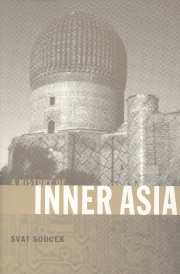Book contents
- Frontmatter
- Contents
- List of maps
- Preface
- Introduction
- 1 The beginnings
- 2 The Kök Turks, the Chinese expansion, and the Arab conquest
- 3 The Samanids
- 4 The Uighur kingdom of Qocho
- 5 The Qarakhanids
- 6 Seljukids and Ghaznavids
- 7 The conquering Mongols
- 8 The Chaghatayids
- 9 Timur and the Timurids
- 10 The last Timurids and the first Uzbeks
- 11 The Shaybanids
- 12 The rise of Russia, the fall of the Golden Horde, and the resilient Chaghatayids
- 13 The Buddhist Mongols
- 14 Bukhara, Khiva, and Khoqand in the seventeenth to nineteenth centuries
- 15 The Russian conquest and rule of Central Asia
- 16 From Governorates-General to Union Republics
- 17 Soviet Central Asia
- 18 Central Asia becomes independent
- 19 Sinkiang as part of China
- 20 Independent Central Asian Republics
- 21 The Republic of Mongolia
- Summary and conclusion
- Appendix 1 Dynastic tables
- Appendix 2 Country data
- Select bibliography
- Index
10 - The last Timurids and the first Uzbeks
Published online by Cambridge University Press: 05 June 2012
- Frontmatter
- Contents
- List of maps
- Preface
- Introduction
- 1 The beginnings
- 2 The Kök Turks, the Chinese expansion, and the Arab conquest
- 3 The Samanids
- 4 The Uighur kingdom of Qocho
- 5 The Qarakhanids
- 6 Seljukids and Ghaznavids
- 7 The conquering Mongols
- 8 The Chaghatayids
- 9 Timur and the Timurids
- 10 The last Timurids and the first Uzbeks
- 11 The Shaybanids
- 12 The rise of Russia, the fall of the Golden Horde, and the resilient Chaghatayids
- 13 The Buddhist Mongols
- 14 Bukhara, Khiva, and Khoqand in the seventeenth to nineteenth centuries
- 15 The Russian conquest and rule of Central Asia
- 16 From Governorates-General to Union Republics
- 17 Soviet Central Asia
- 18 Central Asia becomes independent
- 19 Sinkiang as part of China
- 20 Independent Central Asian Republics
- 21 The Republic of Mongolia
- Summary and conclusion
- Appendix 1 Dynastic tables
- Appendix 2 Country data
- Select bibliography
- Index
Summary
Abu Said was succeeded by two of his sons, the aforementioned Ahmad (ruled 1469–94) and Mahmud (ruled 1494–95), and by the latter's son Ali (ruled 1495–1500), pale personalities whose long years of rule may have been helped – or may have received a special reprieve – by a contrasting set of circumstances south and north of Transoxania. To the south of the Amu Darya ruled their pacific relative Sultan Husayn Bayqara; to the north of the Syr Darya the nomadic Uzbeks, Kazakhs, Moghuls, and Kalmyks were still too busy fighting each other or consolidating their newly formed positions to challenge the Timurids beyond frequent but transitory raids.
We have already mentioned the Uzbek khan Abulkhayr (1412–68; khan from 1428), who in 1451 helped Abu Said gain the throne in Samarkand. Abulkhayr had a Genghisid genealogy going back to the conqueror's eldest son Juchi, as did most other Genghisids of the Dashti Kipchak. He traced his descent, however, not through Batu of the Golden Horde or Orda of the White Horde, but through a younger brother of theirs, Juchi's fifth son Shiban. Shiban too had received an ulus, but farther north, near the southern outcroppings of the Ural Mountains. His descendants benefited from events which had set the khans of the White and Golden Hordes – the Ordaids and Batuids – against each other and which had also provoked Timur's devastating intervention in the last years of the fourteenth century, for the Shaybanids managed to penetrate into what we might call a power vacuum in the territories of the White Horde all the way to the Syr Darya.
- Type
- Chapter
- Information
- A History of Inner Asia , pp. 144 - 148Publisher: Cambridge University PressPrint publication year: 2000



